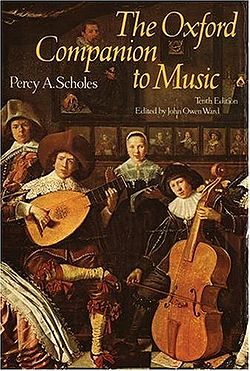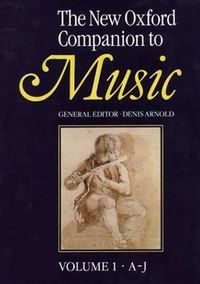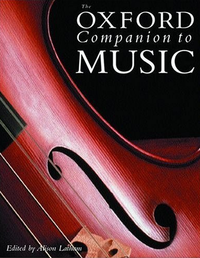
The Oxford Companion to Music
Encyclopedia

Book series
A book series is a sequence of books having certain characteristics in common that are formally identified together as a group. Book series can be organized in different ways, such as written by the same author, or marketed as a group by their publisher....
of Oxford Companions
Oxford Companions
Oxford Companions is a book series published by Oxford University Press. This series provides general knowledge of a specific area, and has included :* The New Oxford Companion to Law* The New Oxford Companion to Literature in French...
produced by the Oxford University Press
Oxford University Press
Oxford University Press is the largest university press in the world. It is a department of the University of Oxford and is governed by a group of 15 academics appointed by the Vice-Chancellor known as the Delegates of the Press. They are headed by the Secretary to the Delegates, who serves as...
. It was originally conceived and written (almost single-handedly) by Percy Scholes
Percy Scholes
Percy Alfred Scholes was an English musician, journalist and prolific writer, whose best-known achievement was his compilation of the first edition of The Oxford Companion to Music...
and published in 1938. Since then, it has undergone two distinct rewritings, one by Denis Arnold
Denis Arnold
Denis Midgley Arnold, CBE was a British musicologist. After being employed in the extramural department of The Queen's University, Belfast, he became a Lecturer in Music at the University of Hull, and from 1969 to 1975 was Professor of Music at The University of Nottingham...
, in 1983, and the latest edition by Alison Latham in 2002. It is "arguably the most successful book on music ever produced" (Wright, p.99).
Single volume edition by Percy Scholes
The first edition, a single volume work, was produced in 1938, edited by Percy Scholes, and written almost entirely by him alone. This work took him six years to produce and consisted of over a million words (exceeding the length of the BibleBible
The Bible refers to any one of the collections of the primary religious texts of Judaism and Christianity. There is no common version of the Bible, as the individual books , their contents and their order vary among denominations...
).
Scholes tried, wherever possible, to use primary source material, rather than summarising other people's work and his preface to the First Edition describes how he played and read through thousands of sheets of music, as well as reading thousands of concert programmes and studying "old literature and long-bygone musical journals". From this research, he produced about fifty-five volumes of notes, each devoted to a separate branch of musical knowledge. He then sought peer review of each of these volumes with specialists in the particular branch of musical knowledge. Finally, these volumes were broken up and re-constituted in alphabetical order.
Scholes' intention was to produce a work which was of relevance to a wide range of readers, from the professional musician to the concert-goer, "gramaphonist", or radio-listener. His work was aimed at a reader for whom it "will neither be beyond the scope of his pocket nor embarrass him by a manner of expression so technical as to add new puzzles to the puzzle which sent him to the book". The result was a work which was highly accessible to the general reader, as well as being of use to the specialist.
Scholes' style, whilst being scholarly and well-researched, was also sometimes quirky and opinionated. For instance, his original articles on some of the twentieth century composers were highly dismissive, as were his articles on genres such as jazz. His entry on the Can-can
Can-can
The can-can is a high-energy and physically demanding music hall dance, traditionally performed by a chorus line of female dancers who wear costumes with long skirts, petticoats, and black stockings...
concludes "Its exact nature is unknown to anyone connected with this Companion."
He produced several revisions prior to his death (in 1958), with the last full revision being the 9th edition in 1955. The Tenth Edition, published in 1970, was a revision of Scholes' work by John Owen Ward. Ward considered it "inappropriate to change radically the characteristic rich anecdotal quality of Dr. Scholes' style" and, although he brought some of the articles up to date, he left much of Scholes' distinctive work intact.
New Oxford Companion to Music

Denis Arnold
Denis Midgley Arnold, CBE was a British musicologist. After being employed in the extramural department of The Queen's University, Belfast, he became a Lecturer in Music at the University of Hull, and from 1969 to 1975 was Professor of Music at The University of Nottingham...
who made extensive use of other specialist contributors, some 90 in all. The work was significantly broader in coverage than Scholes' original (there was for instance a perceptive article on Bob Dylan
Bob Dylan
Bob Dylan is an American singer-songwriter, musician, poet, film director and painter. He has been a major and profoundly influential figure in popular music and culture for five decades. Much of his most celebrated work dates from the 1960s when he was an informal chronicler and a seemingly...
), and is the most extensively illustrated of the three versions.
Arnold expressed his intention of adhering to Scholes’ principles and indeed included much of Scholes’ material in the new work. Nevertheless, he cut out much of the personal opinion and quirkiness which was characteristic of the original, but which increasingly appeared politically incorrect and Eurocentric. For instance, he substantially increased the coverage of women composers and performers, who were almost totally absent from Scholes' work.
There were no further revisions of this version, probably due to Arnold's own early death in 1986, and the relative unpopularity in some circles of the bulk and expense of a two volume work.
2002 revision

Latham assembled her own team of over 120 contributors, some of whom had contributed to the prior (Arnold) edition, and others drawn from her own previous editing work (for example on the Grove Concise Dictionary of Music). This edition consists of some 7400 articles and aims to bring the work up-to-date, for example, in its coverage of areas such as electronic music and computers.
The 2002 revision is, indeed, more up to date, handier and more affordable than its predecessor. However, the 2002 revision abridges the text and eliminates most of the illustrations and on certain subjects is clearly less useful.

